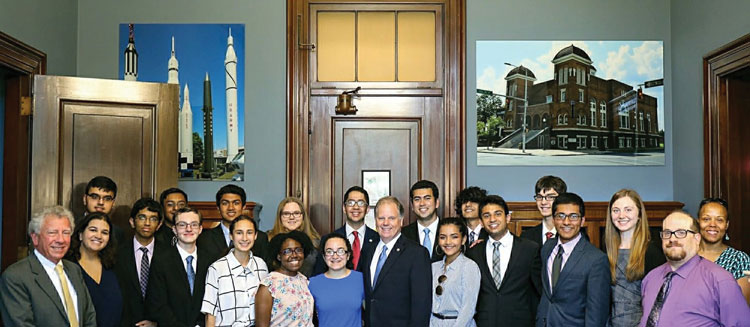High school advocates renew hope for answers to civil rights-era mysteries

Students meet with U.S. Sen. Doug Jones before he introduced the Civil Rights Cold Case Records Collection Act in the Senate in July 2018. press.coldcaseact.com
Racially motivated murders and crimes committed more than six decades ago during the civil rights era remain unsolved and unprosecuted. In most cases, victims and their families got no information, no justice and no closure. Ever wonder what happened? High school students in New Jersey did, and they did something about it, prompting government actions that may soon lead to the release of information about these cold cases.
Four years ago, Stuart Wexler and his advanced placement U.S. Government students at Hightstown High School discussed the 1963 church bombing in Birmingham, Alabama, that killed four girls and injured at least 14 others. While that case was prosecuted decades later, the students were shocked to learn that most cases were never prosecuted and details about them remained classified. Wexler challenged his students to do something about it.
The students wanted to get previously sealed and undisclosed information about these cold cases released. Using a 1992 law to release records from President John F. Kennedy’s assassination as a model, the students created their own legislative solution and drafted a bill to release information from civil rights cold cases. They lobbied to get sponsors for their bill in both the House and the Senate. In December 2018, Congress passed the Civil Rights Cold Case Records Collection Act of 2018 on an overwhelmingly bipartisan basis.
Getting Congress to pass the act was important, but how could high school students persuade the president to sign it into law? Using social media, of course. The students created a website educating people about their efforts. They also started a social media campaign on Twitter, asking people to help urge President Donald Trump to sign the act before it was too late. They were successful, and on Jan. 8, 2019, Trump signed the act into law.
The law requires the National Archives and Records Administration to create a civil rights cold case records collection to preserve the records and to coordinate the disclosure process with other federal agencies. The law also creates a Civil Rights Cold Case Records Review Board to facilitate case review, transmission of information to the archives and potential disclosure to the public.
To pay for the records collection effort at the archives and creation of the review board, the House included over $4 million in its appropriations bill in June. The Senate had not yet considered its appropriations bill at press time, so there is still no approved funding for this effort.
The president, with advice and consent of the Senate, also needs to appoint five people to serve on the review board, one of whom must be an attorney and one a historian. Language put into the law by the students says the president may consider individuals recommended by the American Bar Association, American Historical Association, the Organization of American Historians and the Society of American Archivists. The ABA submitted its nominations to the White House in July, but no appointments have yet been made.
As the 2019-2020 school year begins, Wexler and his new U.S. Government class are again engaged, lobbying Congress to appropriate funding for the cold case review process and urging the president to appoint board members. They remain committed to bringing closure for affected families, and their successful advocacy has raised hopes that access to undisclosed civil rights cold case information may soon be coming.
Despite being too young to vote, these students have already learned how our government works, how to use their voices collectively to effect positive change, and how to strategically use social media to influence policymakers in a complex political environment. Their lessons remind us that real-life civics education is important, and political engagement should not be limited to elections.
The time to make your government work for you is now. Learn more about the issues that are important to the legal profession, and get involved by visiting ambar.org/grassroots.
This report is written by the ABA’s Governmental Affairs Office and discusses advocacy efforts by the ABA relating to issues being addressed by Congress and the executive branch of the U.S. government. Holly Cook is the director of the Governmental Affairs Office.



